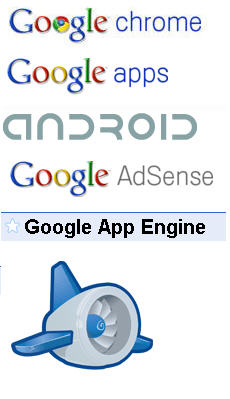With the Chrome OS, Google's software stack is revealed; Shrapnel everywhere

Google is planning to launch lightweight operating system dubbed the Chrome OS that'll target netbooks and Web apps. With the move---clearly targeted at Microsoft---Google's software stack has come into sharp focus in just the last 24 hours. It should be noted, however, that Google's stack is still being formed.

With the Chrome OS announcement Google is entering the software stack game and it'll have implications for Linux, the enterprise, the cloud and Microsoft (albeit much less than you'd think). Coupled with Google's long overdue move to remove the "beta" tag from Google Apps the move into the operating system business all begins to add up.
Google's stack looks like this (Techmeme):
- The Chrome OS;
- The Chrome browser;
- Google Apps (an office suite sans the beta tag);
- Android for mobile;
- The ad monetization model (search based obviously and focused on 'free' services);
- The cloud.
Speed, simplicity and security are the key aspects of Google Chrome OS. We're designing the OS to be fast and lightweight, to start up and get you onto the web in a few seconds. The user interface is minimal to stay out of your way, and most of the user experience takes place on the web. And as we did for the Google Chrome browser, we are going back to the basics and completely redesigning the underlying security architecture of the OS so that users don't have to deal with viruses, malware and security updates. It should just work.
If Google is successful it'll find an audience readily, but enterprises will ask a lot of questions going forward. For instance, how secure will Chrome be? Can it run legacy apps? Where does it fit in my existing stack of stuff? Will consumers drag this OS into my infrastructure? will the Chrome OS be free? And can the Chrome OS be used as leverage against Microsoft?
Also see: Microsoft, hoist by a Chrome petard
- Google Chrome OS is a game changer
- Google goes after Windows with launch of Chrome OS
- Google Chrome OS announced, It should just work
Google will be writing the Chrome OS from the ground up and it'll be very interesting to see what the company cooks up without any legacy shackles. For instance, Windows can't exactly sever 20 years worth of apps at the drop of a hat.
[poll=116]
The Chrome OS story will play out over the next year or so. Here's a look at the items hit by Google OS shrapnel.
- Current desktop Linux players. Ubuntu who? Consumer open source operating systems like Ubuntu have received some interest, but mostly from hard core geeks. If Linux is losing the battle on the netbook to Microsoft now just imagine what'll happen when Google enters the picture. Netbook operating systems will boil down to Google and Microsoft. Everything in the middle will be squeezed out. The Chrome OS is built on the Linux kernel, but if you're a developer Google will begin to equal Linux. Why? Distribution and the cool factor.
- Hardware vendors. Suddenly netbook makers will have a lot more operating systems to offer. These offerings and configurations can be used more to sell more. The risk: Consumers may get confused.
- Web applications. Google Chrome will target Web apps initially and that's great news for that intersection between rich Internet and desktop applications. Rest assured the Chrome OS-Google Apps bundle is coming.
- Microsoft. The Chrome OS isn't likely to ding Windows 7 initially. Given Chrome's limited scope in the beginning there may be a sliver of margin pressure on Microsoft. The battle in the long run will be interesting though.
If the operating system wars turn out to be as competitive as the browser showdown we could be en route to a nice innovation phase.